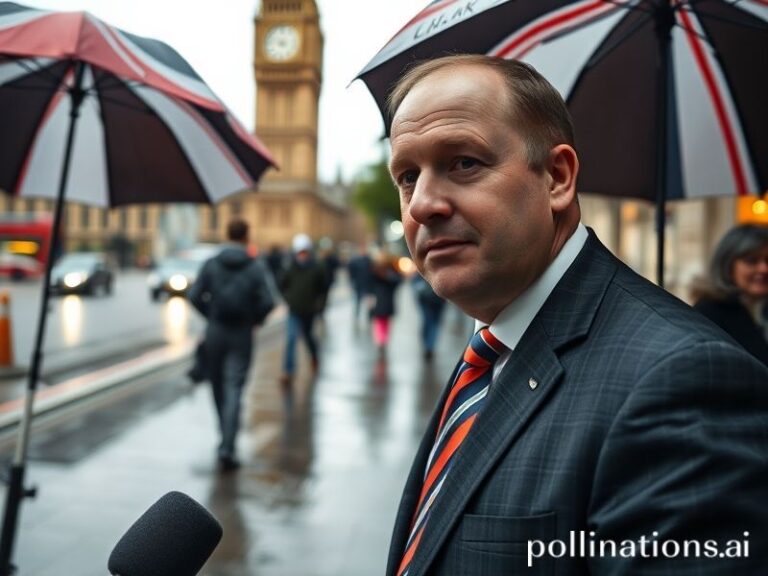Robin Wright’s Global Farewell Tour: Selling American Collapse to the Rest of the World with a Smile
Robin Wright, the accidental oracle of American decline, landed in London last week to promote her latest film and promptly offered the British press a masterclass in how to sound cosmopolitan while selling them their own post-Brexit melancholy back to them. The woman who once embodied the icy perfection of a Beltway power-wife now drifts through European capitals like an elegant memento mori for Pax Americana, her cheekbones sharpened by decades of watching empires—on screen and off—crumble with the grace of a drunk on a Segway.
It is tempting, of course, to treat Wright as merely another Hollywood exile laundering her career in the streaming wars’ global bazaar. Yet her itinerary—Berlin, Paris, Sarajevo, and now London—reads less like a junket and more like a funeral procession for the liberal order she once dramatized. In each city, local journalists ask her, with the reverence reserved for relics, what Claire Underwood might do about their own collapsing coalitions. Wright tilts her head, smiles the small, dangerous smile that once launched a thousand think pieces, and replies that Claire would probably monetize the chaos and call it disruption. The room laughs, because discomfort dressed as wit is the lingua franca of late capitalism.
The irony, which Wright wears as lightly as her cashmere coat, is that while American soft power recedes like a hairline, its cultural exports mutate into stranger, more potent strains abroad. In South Korea, House of Cards is binge-watched as a management seminar; in Brazil, it’s a cautionary telenovela about coups; in Nigeria, it’s background noise for cryptocurrency scams. Wright, the face of that fictional hegemon, has become a Rorschach test for whatever fresh dread each nation projects onto the dying superpower. She knows it, too. “I’m basically a screensaver for geopolitical anxiety,” she quipped in Berlin, earning the sort of polite European chuckle that suggests the continent has already priced in the apocalypse.
Meanwhile, back in Washington—where the real-life Underwoods now serve hors d’oeuvres at indictment parties—Wright’s continued relevance irritates the political class the way a persistent cough irritates a funeral director. They resent that a fictional character haunts their LinkedIn feeds with more menace than their actual legislation. They console themselves by noting that at least Claire never had to fundraise via TikTok. Small mercies.
From a global vantage, Wright’s career arc mirrors America’s own: meteoric rise, moral compromise, cosmetic reinvention, eventual expatriation. The European press, ever eager to diagnose Yankee pathologies, pores over her interviews for clues like Kremlinologists studying May Day footage. When she praises European social safety nets with the faint condescension of a reformed smoker, Italian columnists diagnose “imperial guilt”; German pundits hear “late-stage empire self-care.” Everyone leaves satisfied that their prejudices have been confirmed by a celebrity, which in 2024 counts as multilateral diplomacy.
The broader significance? In an era when nations outsource statecraft to algorithms and oligarchs, the symbolic economy still runs on flesh-and-blood avatars. Robin Wright—actor, producer, reluctant geopolitical metaphor—travels the world reminding audiences that while America’s hardware may rust, its narrative firmware still reboots in foreign heads every time Netflix autoplays. She is both product and symptom: the beautiful ghost in the machine, selling the spectacle of collapse back to the people living through it. Audiences applaud, partly out of habit, partly out of relief that at least someone still knows how to stick the landing.
As she left the London hotel, a young French journalist asked whether Claire Underwood could survive in Europe’s fractured political landscape. Wright paused, adjusted her sunglasses against a drizzle that felt positively Brechtian, and said, “Darling, Claire survives everywhere. It’s the rest of us I worry about.” Then she stepped into a black car that probably runs on diesel irony and disappeared into the traffic of a continent wondering whether it’s witnessing America’s wake—or merely its intermission.







